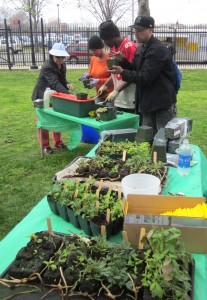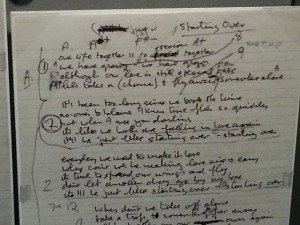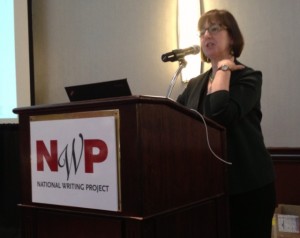New feature: writers’ drafts
I will try to post one each time I write. Here’s the inaugural one: a draft (probably not the first draft), written by John Lennon, of his 1980 song, “Starting Over.” Click on the image if you want to look more closely. Examine and enjoy.
Updates
 It is finally, unambiguously spring. The Lehman College trees are once again pink and white, and work has resumed in the Edible Garden, where you will find Adult Learning Center students and teachers preparing the soil and planting shoots and seeds. To get news and updates, “like” the Lehman Edible Garden on Facebook. I could go on about how the ALC has taken on the Garden as a site for interdisciplinary literacy learning within the context of food justice issues, but enjoy this photograph instead: ALC students in the Garden just a couple of days ago!
It is finally, unambiguously spring. The Lehman College trees are once again pink and white, and work has resumed in the Edible Garden, where you will find Adult Learning Center students and teachers preparing the soil and planting shoots and seeds. To get news and updates, “like” the Lehman Edible Garden on Facebook. I could go on about how the ALC has taken on the Garden as a site for interdisciplinary literacy learning within the context of food justice issues, but enjoy this photograph instead: ALC students in the Garden just a couple of days ago!
So I survived my keynote workshop (“What is College Writing Anyway? A Cross-disciplinary Look”) for the National Writing Project on March 22, 2013 in Washington, DC. Erick Gordon took this picture: it proves that I didn’t chicken out.
Thanks to Elaine Avidon, Ed Osterman, Ashleigh Stanfield, Phyllis Williams, and Paul Allison for helping me with content and production, and to everyone who gave me some space while I was stressing over this.
Accolades and fabulousness
Elected last fall, Suzanne Libfeld, NYC Mathematics Project Director, assumed her position as Eastern 1 Regional Director of the National Council of Supervisors of Mathematics on April 17 at the annual NCSM conference in Denver, Colorado. Congratulations, Suzanne, and remember: uneasy lies the head that wears the crown.
Jaye Jones gave a wonderful talk on April 17 as part of the Lehman Women’s Studies Program Spring Lecture Series. Here’s the blurb:
“Literature, Learning & Life: Supporting and Empowering Women in Adult Literacy Programs”
This lecture will discuss the impact of Women Reading for Education Affinity and Development (WREAD), a reading discussion intervention grounded in theories of relational-cultural theory (RCT), critical pedagogy and black feminist theory committed to using literature, dialogue and group process to promote relationship building and empowerment among African American female adult literacy learners. The literacy gains, improved psychological self-awareness, and positive connections experienced by WREAD’s participants also serve to illustrate the restorative potential of emotionally responsive models of teaching practice.
I am looking forward to more discussions of Jaye’s past work, and to seeing the ways in which her study informs some of the new work at the Adult Learning Center.
Speaking of new work, Jaye and the ALC have just been awarded a grant from the American Association of University Women for Project RISE, a special class with some of the same theoretical foundations as WREAD. The goal of the project is to strengthen female adult learners’ academic skills and confidence, and support pursuit of STEM careers. ALC teachers will develop a curriculum, using as a core text Rebecca Skloot’s The Immortal Life of Henrietta Lacks, a compelling nonfiction narrative from which students can critically investigate issues related to public health, medical ethics, intergenerational poverty, biological science, and quantitative reasoning. Thanks to Jaye and Anne Campos, along with the writing team at the ALC!
Reading/clicking around
From our friends at Rethinking Schools, here is a recent article: Whose Community is This? The Mathematics of Neighborhood Displacement. The writer, a math teacher and member of the school design team, describes a project investigating the economic complexities and real-world implications of mortgage math in a high school serving low-income African American and Mexican immigrant students, Social Justice High School in Chicago.
This new report from the National Center for Literacy Education (a coalition of organizations that includes the National Writing Project) focuses on the vital role that teacher collaboration plays in sustaining growth in literacy learning. Their policy recommendations include:
-
Provide the necessary support to ensure that educators know how to teach the elements of literacy pertinent to their content areas.
-
Embed the collaboration of educators in the school day. This is critical for deep student learning and is a necessary prerequisite to the success of other school reforms.
-
Fund professional learning that is ongoing, job-embedded, and collaborative; educators who engage in this kind of learning are better able to engage and advance literacy learning across grades and subjects.
-
Structure the use of educator time to maximize the development of collective capacity for improving literacy learning across a school or school system.
-
Promote accountability by encouraging educators in a school or system to reach shared agreements about successful literacy learning and the steps they will take together to fulfill these agreements.
Upcoming events
April 27: NYC Writing Project conference featuring keynote talks by Peter Elbow and Katherine Schulten and a host of sessions led by Writing Project teacher-presenters.
May 4: NYC Math Project conference featuring a keynote talk by Andy Clark and sessions conducted by teacher-presenters.
May 17: Adult Learning Center Community Connections Fair featuring a host of Bronx community partners representing health, food, and employment interests.
On academic discourse, cities, and Boston
I do love cities, their physical spaces, their vibrant density. Some of you know that I am an avid reader of city fiction–particularly books that feature NYC. For a book to be truly satisfying to me, the city has to function as metaphor as well as setting, as it does in Zone One, or Chronic City, or even House of Mirth. In my own field, composition, I love Joseph Harris’s argument against “community” and for “city” as a metaphor for how university students and teachers use, make, and respond to language across disciplines. Harris writes:
…instead of presenting academic discourse as coherent and well-defined, we might be better off viewing it as polyglot, as a sort of space in which competing beliefs and practices intersect with and confront one another…. The metaphor of the city would also allow us to view a certain amount of change and struggle within a community not as threats to its coherence but as normal activity.
The quote above is from a favorite book of mine, Harris’s A Teaching Subject: Composition Since 1966, now available in a new edition. I launched on this theoretical aside as a way of using my day job to enter the conversation about what happened in Boston earlier this week. Boston is a place, like New York, where change and struggle, competing beliefs and practices, unfold in its divided schools and neighborhoods as well as in its residents’ passionate love of place. My thoughts are there this week.
Follow me on Twitter (@marwol), if you are so inclined.
Be well,
Marcie





Very interesting blog. I’m looking forward to the 4/27 Writing Project Conference. I feel the need to say that everything I learn about Jaye’s educational background makes so much sense because it’s what I feel from her on a day-to-day basis. It’s who she is.
From someone that was in the audience in DC——“What is College Writing Anyway? A Cross-disciplinary Look” was a fabulous keynote/workshop. The room was lit up with engaged participation.
Marcie, you truly knocked it out of the park!